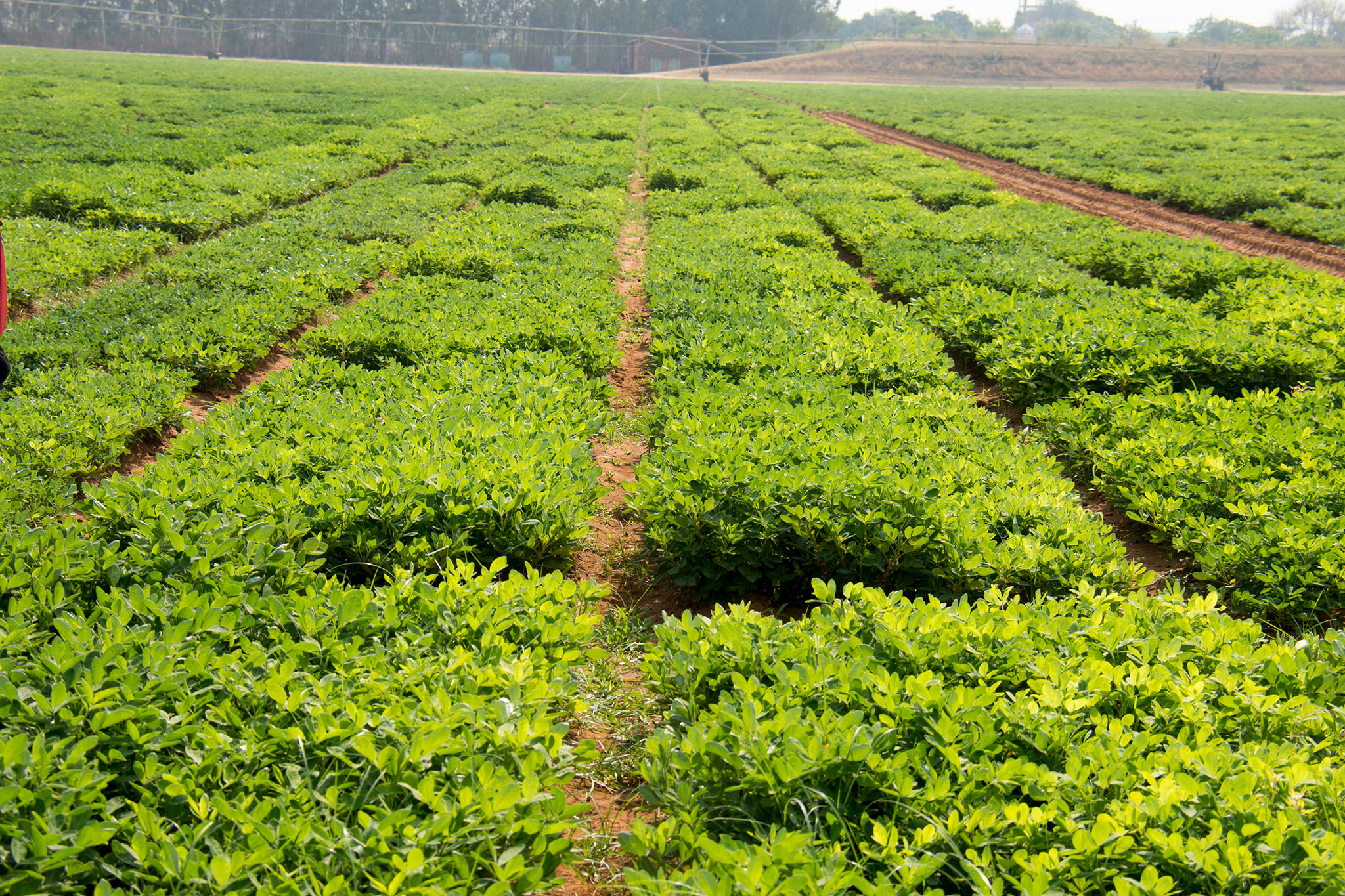Scientific name: Arachis hypogaea.
Common name: Moongfali (Hindi)
Cultivated extensively in tropical, subtropical, and warm temperate regions, groundnut has firmly established its place in global agriculture. Covering an extensive area of approximately 32.7 million hectares, groundnut production witnessed an impressive annual yield of 53.9 million tons in 2021 (according to FAOSTAT). Notably, the leading producers of groundnut are China, followed closely by India, highlighting the crop's immense economic and nutritional significance in these regions.
Since 1976, ICRISAT has been at the forefront of groundnut (peanuts) genetic improvement, with its headquarters in Patancheru serving as the starting point. The institute's efforts included acquiring germplasm, establishing breeding programs, and collaborating with National Agricultural Research Systems (NARS) across diverse countries in Africa and Asia. In response to the needs of the Eastern and Southern Africa (ESA) and West and Central Africa (WCA) regions, ICRISAT expanded its genetic improvement program to regional locations in Mali (originally established in Niger in 1998 and then moved to Mali in 1998) and Malawi (established in 1982).
Collaborating with NARS from 47 different countries in Africa and Asia, ICRISAT's groundnut team actively engages with the private food and seed industry to deliver demand-led groundnut crop products to stakeholders. The institute has successfully released approximately 225 groundnut varieties for cultivation in 38 different countries, all developed using ICRISAT supplied germplasm. Noteworthy milestones include the release of the world's first early-maturing groundnut variety in 1996 and the world's first variety combining foliar fungal disease resistance and early maturing properties using genomic tools.

As part of the 12-year Tropical Legumes project, ICRISAT has developed 101 improved groundnut varieties tailored for 12 countries, highlighting the institute's commitment to enhancing groundnut research and crop development.
ICRISAT's multi-disciplinary groundnut breeding team is devoted to accelerating the rate of genetic gain within the breeding pipeline while making progress in improving operational and cost efficiencies.
Some key highlights from ICRISAT's groundnut breeding work include:
High yielding and short-duration varieties: ICRISAT has successfully developed early maturing, high-yielding, and large kernel-sized groundnut varieties using hybridization, which have been widely adopted in India, Malawi, Tanzania, Uganda, Ghana, and Burkina Faso.
High oleic groundnut varieties: Pioneering the development of India's first high oleic acid (HOA) groundnut varieties, Girnar 4 (ICGV 15083) and Girnar 5 (ICGV 15090), ICRISAT collaborated with the Indian Council of Agricultural Research-Directorate of Groundnut Research (ICAR-DGR) and later released two Spanish-type HOA groundnut varieties, GG 40 (ICGV 16668) and GG 39 (ICGV 16697) in partnership with Junagadh Agricultural University (JAU-Gujarat). These HOA lines are currently under testing for commercialization in Myanmar, Bangladesh, India, South Africa, Mali, and Malawi.
Disease Resistance: ICRISAT's groundnut researchers are focused on improving existing popular varieties and introducing improved varieties that are resistant to common diseases like groundnut rosette and leaf spot virus. The Tropical Legumes project has driven efforts to develop high-yielding, disease-resistant varieties, reducing productivity risks for farmers.
Aflatoxin Management: Aflatoxin contamination poses a significant challenge to groundnut export. ICRISAT has extensive experience in aflatoxin management and has developed various technologies to mitigate risks, including tolerant cultivars, optimal harvesting and drying techniques, and the use of control agents. Through ICRISAT's intervention on aflatoxin management, Malawi's groundnut exports to South Africa and the European Union have been successfully revived.
ICRISAT remains committed to advancing groundnut research, enhancing crop productivity, and supporting sustainable agricultural practices that benefit smallholder farmers and contribute to global food security.
ICRISAT's breeding program is dedicated to continuous improvement, constantly reviewing and updating market segments for each crop in close collaboration with various stakeholders. By defining specific market segments, the program can prioritize breeding traits that address current challenges faced by farmers, consumers, processors, and other key players in the agri-food value chain.
For groundnut, ICRISAT's breeding program is presently focused on two distinct market segments:
Groundnuts for Oil Extraction and Home Consumption:
Maturity Duration: Developing varieties with optimal maturity periods.
Resistance to Leaf Spots and Rust: Enhancing disease resistance for improved crop health.
Seed Weight: Focusing on varieties with desirable seed sizes.
Shelling Percentage: Improving the ease of shelling and processing.
Total Oil Content: Developing groundnut varieties with higher oil content.
Oleic Acid Content: Enhancing varieties with higher oleic acid levels for nutritional value.
Yield: Enhancing groundnut varieties with high yield potential.
Groundnuts for Food, Snacks, and Confectionary Purposes:
Maturity Duration: Developing varieties with suitable maturation periods for different purposes.
Resistance to Leaf Spots and Rust: Enhancing disease resistance for healthy crops.
Yield: Focusing on high-yielding groundnut varieties.
Seed Weight: Considering varieties with specific seed sizes for different uses.
Shelling Percentage: Improving the ease of shelling and processing.
Oil Content: Developing groundnut varieties with suitable oil content for culinary applications.
Oleic Acid Content: Enhancing varieties with specific oleic acid levels for snack and confectionary purposes.
By concentrating on these distinct market segments, ICRISAT aims to cater to the diverse needs of different stakeholders, ensuring that groundnut varieties meet specific requirements for oil extraction, home consumption, food preparation, snacks, and confectionary purposes. This strategic approach not only addresses the current challenges faced by the groundnut industry but also aligns with the preferences and demands of consumers and the agri-food value chain stakeholders.
Should you have any questions our dedicated support team is ready to help. Please email: research@icrisat.org